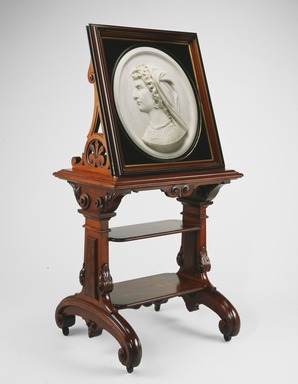
Artist:Margaret FoleyUnknown
Medium: Marble, wood
Geograhical Locations:
Dates:ca. 1865
Dimensions: Overall: 58 3/8 x 29 1/4 x 25 1/2 in. (148.3 x 74.3 x 64.8 cm) Marble portrait (sight): 22 x 19 in. (55.9 x 48.3 cm) Frame: 28 x 25 x 3 1/2 in. (71.1 x 63.5 x 8.9 cm) Display Table (excluding brackets): 31 1/2 x 29 1/4 x 25 1/2 in. (80 x 74.3 x 64.8 cm)
Collections:
Exhibitions:
Accession Number: 2003.55a-d
Image: 2003.55a-d_SL3.jpg,
Catalogue Description:
Framed marble bas-relief portrait (b) and wooden display table (a) with two removable shelves (c & d). White marble relief: oval medallion containing a profile bust portrait of Pasuccia, a well-known Roman artists' model. She has curly hair and her head is partially covered with a hood or drape; she wears hoop earrings with beads and a beaded necklace with a cross. Marble relief is housed in a wooden frame within an ebonized matte with gilded edges. Frame has molded edges with ebonized and gilded accents. Renaissance Revival style display stand (possibly Virginia walnut): rectangular tabletop with molded edge supported on two legs. In profile, the legs are a general pilaster form with raised rectangular panels of birds eye maple veneer in center, and scrolls and acanthus leaf decorations in "capital" and at sides; legs terminate in low arch with scrolled terminals forming a total of four feet; feet raised on casters. Attached to the top of the table are two openwork wood brackets with carved scroll and floral motifs; these brackets support the frame with the marble relief. Two removable rectangular shelves with rounded corners are set between the legs; the upper shelf is slightly smaller than the lower one.